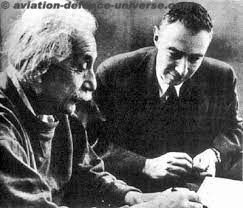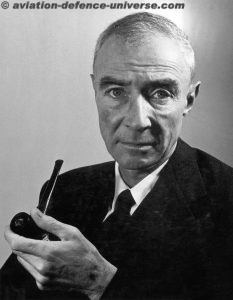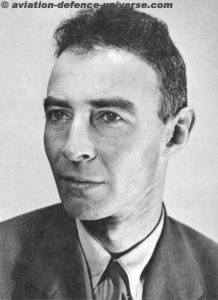By Sangeeta Saxena
New Delhi. 06 August 2023. Every year on 6th of August I sit down to write with a heavy heart the story of the biggest tragedy of modern times and curse science for having created demons of destruction, the ghosts of which still follow humanity. The only change 2023 brought about was the name Oppenheimer becoming household and for once Albert Einstein ceased to be the cynosure of world’s eyes on the day of Hiroshima bombing. And this is courtesy Hollywood.
And who was this man ? Let us get to know Julius Robert Oppenheimer who lived a life the world would remember even after 78 years with both awe and disdain. Born on April 22, 1904 and died on February 18, 1967, he was an American theoretical physicist and director of the Manhattan Project’s Los Alamos Laboratory during World War II and is often called the “father of the atomic bomb”.
Born in New York City to Jewish immigrants from Germany, Oppenheimer earned a bachelor’s degree in chemistry from Harvard University in 1925 and a doctorate in physics from the University of Göttingen in Germany in 1927. After research at other institutions, he joined the physics department at the University of California, Berkeley, where he became a full professor in 1936. He made significant contributions to theoretical physics, including achievements in quantum mechanics and nuclear physics such as the Bohr–Oppenheimer approximation for molecular wave functions, work on the theory of electrons and positrons, the Oppenheimer–Phillips process in nuclear fusion, and the first prediction of quantum tunneling. With his students, he also made contributions to the theory of neutron stars and black holes, quantum field theory, and the interactions of cosmic rays.
 But the man who virtually eclipsed his presence-Albert Einstein- came to be called the father of the atomic bomb. Very few knew that in 1942, Oppenheimer was recruited to work on the Manhattan Project, and in 1943 he was appointed director of the project’s Los Alamos Laboratory in New Mexico, tasked with developing the first nuclear weapons. His leadership and scientific expertise were instrumental in the project’s success. On July 16, 1945, he was present at the first test of the atomic bomb, Trinity. In August 1945, the weapons were used against Japan in the bombings of Hiroshima and Nagasaki, the only use to date of nuclear weapons in an armed conflict.
But the man who virtually eclipsed his presence-Albert Einstein- came to be called the father of the atomic bomb. Very few knew that in 1942, Oppenheimer was recruited to work on the Manhattan Project, and in 1943 he was appointed director of the project’s Los Alamos Laboratory in New Mexico, tasked with developing the first nuclear weapons. His leadership and scientific expertise were instrumental in the project’s success. On July 16, 1945, he was present at the first test of the atomic bomb, Trinity. In August 1945, the weapons were used against Japan in the bombings of Hiroshima and Nagasaki, the only use to date of nuclear weapons in an armed conflict.
His life post the war became a shadow of his war time existence. In 1947, Oppenheimer became the director of the Institute for Advanced Study in Princeton, New Jersey, and chaired the influential General Advisory Committee of the newly created U.S. Atomic Energy Commission. He lobbied for international control of nuclear power to avert nuclear proliferation and a nuclear arms race with the Soviet Union. He opposed the development of the hydrogen bomb during a 1949–1950 governmental debate on the question and subsequently took positions on defense-related issues that provoked the ire of some U.S. government and military factions.
 During the Second Red Scare, Oppenheimer’s stances, together with his past associations with the Communist Party USA, led to the revocation of his security clearance following a 1954 security hearing. This effectively ended his access to the government’s atomic secrets and thus his career as a nuclear physicist. Stripped also of his direct political influence, Oppenheimer continued to lecture, write, and work in physics. In 1963, he was awarded the Enrico Fermi Award as a gesture of political rehabilitation. He died four years later from throat cancer. In 2022, U.S. Secretary of Energy Jennifer Granholm ordered that the 1954 decision to revoke Oppenheimer’s security clearance be vacated.
During the Second Red Scare, Oppenheimer’s stances, together with his past associations with the Communist Party USA, led to the revocation of his security clearance following a 1954 security hearing. This effectively ended his access to the government’s atomic secrets and thus his career as a nuclear physicist. Stripped also of his direct political influence, Oppenheimer continued to lecture, write, and work in physics. In 1963, he was awarded the Enrico Fermi Award as a gesture of political rehabilitation. He died four years later from throat cancer. In 2022, U.S. Secretary of Energy Jennifer Granholm ordered that the 1954 decision to revoke Oppenheimer’s security clearance be vacated.
Oppenheimer has been an enigma few claim to understand. He has been the subject of many biographies, including American Prometheus (2005) by Kai Bird and Martin J. Sherwin, which won the 2006 Pulitzer Prize for Biography or Autobiography. The 1980 BBC TV serial Oppenheimer, starring Sam Waterston, won 3 BAFTA Television Awards. The Day After Trinity, a 1980 documentary about Oppenheimer and the atomic bomb, was nominated for an Academy Award and received a Peabody Award. Oppenheimer’s life is explored in Tom Morton-Smith’s 2015 play Oppenheimer, and the 1989 film Fat Man and Little Boy, where he was portrayed by Dwight Schultz. In the same year, David Strathairn played Oppenheimer in the TV movie Day One. And just a month back the American film Oppenheimer, directed by Christopher Nolan and based on American Prometheus, Oppenheimer is portrayed by actor Cillian Murphy hit the screens world over and made him a household name.
A centennial conference about Oppenheimer’s legacy was held in 2004 at the University of California, Berkeley, alongside a digital exhibition on his life, with the conference proceedings published in 2005 as Reappraising Oppenheimer: Centennial Studies and Reflections. His papers are in the Library of Congress.
As a scientist, Oppenheimer was remembered by his students and colleagues as a brilliant researcher and engaging teacher who founded modern theoretical physics in the United States. “More than any other man”, Bethe wrote, “he was responsible for raising American theoretical physics from a provincial adjunct of Europe to world leadership”. Because his scientific attentions often changed rapidly, he never worked long enough on any one topic and carried it to fruition to merit the Nobel Prize, though his investigations contributing to the theory of black holes might have warranted the prize had he lived long enough to see them brought to fruition by later astrophysicists. An asteroid, 67085 Oppenheimer, was named in his honor on January 4, 2000, as was the lunar crater Oppenheimer in 1970.
As a military and public policy advisor, Oppenheimer was a technocratic leader in a shift in the interactions between science and the military, and in the emergence of “big science”. During World War II, scientists became involved in military research to an unprecedented degree. Because of the threat fascism posed to Western civilization, they volunteered in great numbers for technological, and organizational, assistance to the Allied effort, resulting in powerful tools such as radar, the proximity fuze and operations research. As a cultured, intellectual, theoretical physicist who became a disciplined military organizer, Oppenheimer represented the shift away from the idea that scientists had their “heads in the clouds” and that knowledge of esoteric subjects like the composition of the atomic nucleus had no “real-world” applications.
India had a special place in his heart due to his fondness for the Bhagwad Gita. It is said that two days before the Trinity test, Oppenheimer expressed his hopes and fears in a quotation from Bhartṛhari’s Śatakatraya:
In battle, in the forest, at the precipice in the mountains,
On the dark great sea, in the midst of javelins and arrows,
In sleep, in confusion, in the depths of shame,
The good deeds a man has done before defend him.
Oppenheimer remains a mystery to be unravelled even though the world claiming to have discovered him and his contribution to modern day science. A man who should have been a national hero in his country died in anonymity.





























































































































